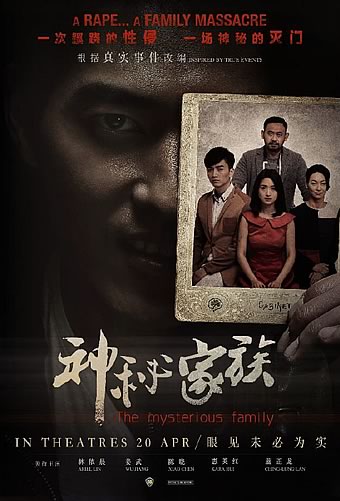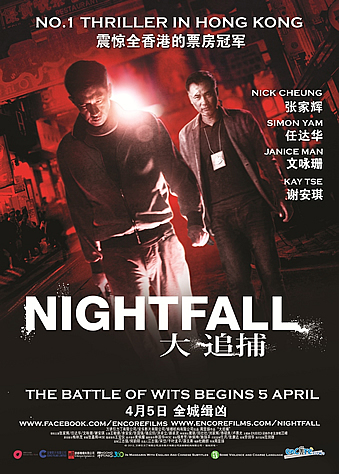SOMEWHERE BEYOND THE MIST (蓝天白云) (2017) [SCFF 2018]
Genre: Drama
Director: Cheung King-Wai
Cast: Stephy Tang, Rachel Leung, Kyle Li, Baby Bo
Runtime: 1 hr 26 mins
Rating: TBA
Screening Dates: 28 April 2018 (visit scff.sg/films/somewhere-beyond-the-mist/ for showtimes)
Synopsis: Angela is a cop in charge of investigating the murder of a married couple. Her father, who suffers from dementia, has always been a nuisance. Sensitive from pregnancy, Angela discovers strange aspects of the murder while investigating Connie, a high school girl who has turned herself in. Connie, born with a heart defect, is close with Eric, her gay classmate. Upset by her violent, perverted father and indifferent mother, Connie conspires with Eric to commit the crime, as the details of the shocking murder are gradually revealed in Connie’s testimony.
Movie Review:
“In most cases, people – even wicked people – are far more naïve and simple-hearted than we generally assume. And so are we.”
So goes the Dostoevsky quote from ‘The Brothers Karamazov’ that opens the film, a plodding and pretentious crime drama that aims for socio-political commentary but fails spectacularly. The first fiction feature of documentary filmmaker Cheung King-Wai, who had won three Golden Horse awards for ‘KJ: Music and Life’ back in 2009, ‘Somewhere Beyond the Mist’ draws on true events to tell the parallel stories of a teenage girl who had murdered both her parents in cold blood and the female detective in charge of the case.
Employing a fractured chronology, Cheung introduces us first to the latter named Angela (Stephy Tang) struggling to cope with caring for her dementia-stricken father (Wong Shu Tong). Right from the start, it is clear that relations between father and daughter are fraught, although we are not told why. Notwithstanding, Angela grows more and more hostile towards her father further along the investigation, suggesting that something about the case itself that may be fueling her own familial sentiments. Alas, that is never adequately explained even at the end of the film, so don’t go expecting that your patience in that regard will be rewarded. That’s not the only issue we have with this arc of the film, but we’ll get to that later.
Juxtaposed with Angela’s escalating resentment is a whydunnit – not a whodunnit or howdunnit, mind you, since the 14-year-old Connie (Rachel Leung) readily confesses to the crime after being picked up by the police – that unfolds as a series of flashbacks leading up to the brutal strangulation of her misogynistic father (Chan Chit-man) and physically disabled mother (Baby Bo). Not only does Connie’s father openly watch pornography in front of her mother, he starts to play sugar daddy to one of her schoolmates, even bringing the latter home to have dinner with the entire family as if it were perfectly normal. There is no doubt that these scenes are designed to provoke your outrage, as it does Connie, who eventually cajoles her close friend Eric (Zeno Koo) to help murder both her parents.
As much as we do share Connie’s seething anger at her father’s appalling behavior, the film doesn’t build a compelling story for why her first resort would be to murder him, and more so her mother, whom we never learn why she turns a blind eye to his misdeeds and/or fails to protect Connie. Even less convincing is why Eric would so readily go from docility to murder most vengeful, or why the pair would readily let themselves be found by the police as well as confess their crimes at the first instance.
Oh yes, the logic gaps are aplenty here, which fundamentally undercuts the portrait of everyday evil that writer-director Cheung tries to paint, even as it is depicted against the more impoverished members of society whom we are supposed to assume have either little to lose or have an entirely different sense of morality. But then how would one explain the laughably hysterical scene involving Angela, her husband and her father in a public taxi, in which her father starts screaming after she rebuffs his offer of an egg tart with a slap?
In truth, the whole film reeks of pretension – from its ostensibly intense but detached observations of Connie’s life, to the supposed thematic links between Connie and Angela’s respective lives, and to the intended evocative shots of Hong Kong’s mountain countryside next to the suffocating atmosphere inside the homes of those who live on it. Even though it runs at less than one and a half hours, it also feels much, much longer, due to a perplexingly deliberate pace that is less meditative than frustrating. It doesn’t help that Cheung’s direction to his actresses Tang and Leung often seem to be to put on a stoic expression and nothing more, resulting in even duller moments.
Like its title suggests, ‘Somewhere Beyond the Mist’ is just as ambiguous about what it wants to say or what it wants its audience to take away. Its Chinese title of ‘blue skies and white clouds’ hints at innocence, which is probably meant as contrast to the evil we see onscreen, but such allusions to judgments of morality sit awkwardly in a film that refuses to take sides with or against its protagonists. You may be enticed by Cheung’s name on the film, or for that matter its producer Derek Yee and/or its artistic adviser Ann Hui, but chances are you’ll find yourself somewhere left in the cold by this hollow, pompous and ultimately fake meditation on evil, morality and socio-economic poverty.
Movie Rating:


(As muddled as its title suggests, this crime drama aiming for socio-political commentary is artificial, pretentious and ultimately hollow)
Review by Gabriel Chong
You might also like:





-2april2015 (3).jpg)